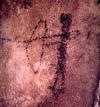Inventing Our Humanity
[Translations: Japanese]
There are two opposing views of technology. One, that it of us, and the other that it is not us. The following is my view that it is us.
The technium is necessary for us to be fully human. As we create art, invent social structures and map the universe we discover who we are. Without these inventions – even simple ones like poetry, clothes, fire, and hand tools – we don’t know anything about ourselves. Technology not only reveals our humanness, it is the way we are human. We create our humanness by creating the technium.
 The downsides to our inventions – the wars, weapons, holocausts, pollution – these too define our being. We would like to remember ourselves at the times we lift ourselves above technic temptations, rising above technologies’ vices in order to build, cooperate, and create. But even when technology destroys, that too is our identity. Either way, without the cloak of technology we are incomplete.
The downsides to our inventions – the wars, weapons, holocausts, pollution – these too define our being. We would like to remember ourselves at the times we lift ourselves above technic temptations, rising above technologies’ vices in order to build, cooperate, and create. But even when technology destroys, that too is our identity. Either way, without the cloak of technology we are incomplete.
We need technology for more than a robe; it is part of our soul. The less technology we have, the less human we are; the more technology we have the more human we can be.
Because of the stiff, cold, unbending nature of raw steel, brick, and silicon, we tend to view the expanding technium as alien, as if it were an ascendant species in opposition to us, if not all living things. The worst of the industrial age – black lung smoke, black river waters, blackened short lives working in the mills – is so distant from our immediate self-conception that we banish all technology to the devil. Cast as evil, even if a necessary evil, the technium is set outside ourselves, and treated like an infection when it appears among us.
Our painters and poets imagine an age before the devil, before the technium, when naked human bodies lived in harmony amidst millions of other benign species. These earlier folks (and the remnants of indigenous peoples today) are perceived as true humans, untainted by the artificial contraptions of technology. Considered to be in touch with their spiritual side, in tune with nature, they once had time to discover what it means to be human; Ever since, the perception goes, that keen cosmic awareness they won has degenerated into a dull stupor, often seen in front of a TV screen.

In fact there never was a noble savage, or a technology-less people. Researchers debate the extent to which early peoples disturbed their environment, but not that they did disturb it. American native tribes eliminated a dozen species of herbivores – like the mammoth – before the arrival of European technology. Using very simple stone technology the ancient inhabitants of Easter Island eliminated all the trees and their only way of escape from a dying island. Even the Amazon rainforest, which contemporary opinion views as primeval, is in fact a landscape shaped by the technology of its human aboriginal inhabitants, as low as their populations were and are. If there were no Indians at all living in the Amazon it would be far more dense in the under story, there would be a different mix of animals and plants due to the relief from hunting larger animals, and many plants that do appear would be rarer without the mild encouragement of humans.
An altered environment, yes, but how do tools alter humans themselves? With bow, arrow and blow pipe, humans defined themselves as hunters, as crafty hunters, as wily hunters unlikely to be outsmarted by wily prey. When humans invented the ax, they invented murder. We know from recent observations that wild chimpanzees will kill other chimps in war and jealousy. Killing we humans have always done too. But when we made the ax, we defined the killing of our own species in a different way. With the tool of language we finessed the act with nuances: was it provoked? Was it necessary? Was it deliberate? Technology increased the leverage of killing, language technology increased our analysis of it, and together they gave us murder as an option. Humans murder; other animals merely kill.
With the technology of writing, we awoke to laws, and with laws we birthed the human sense of fairness. Writing created facts and evidence; from these we fancied ourselves as logical. From the accumulation of experience that could be transmitted to another generation we gained our humane notion of wisdom. In rituals, we invented the religious being. Instruments made of wood and string made humanity musical.
We humans extended our humanity by means of culture. More than anything else, culture is what defines us. Culture is soft technology, but an invention nonetheless.
Our humanity has been extended. Our sense of morality, our sense of fairness, of what is right, or what is good, indeed of what we are here for in the end – all this has evolved in time as our technology and culture evolved. Some of that progress we have internalized, some of it has become hardwired and is thus universal, yet much of it – much of our humanness – is carried in the apparatus of what we make. It is carried via education, traditions, writings, architecture, society, and the extreme pressure of what other intelligences think.
In the end the technium is not alien. It is us turned inside out. It will continue to evolve. As we increase the technium in scale and complexity, as we continue to modify ourselves via education, medicines, genetics and hardware, we will expand what it means to be human. We will continue to depend on technology to complete our being.


